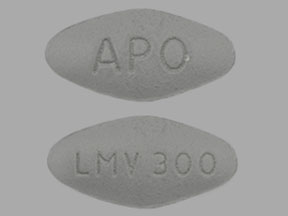
Lamivudine Coupons & Savings Card – Discount Prices from $73.34
Generic for: Epivir, Epivir hbv
My prescription
Edit
300MG, Lamivudine (90 Tablets)
Select pharmacy

CVS
$73.34
COUPON PRICE
Walgreens
$133.20
COUPON PRICE
Walmart
$136.77
COUPON PRICE
Albertsons
$137.09
COUPON PRICELamivudine savings card
Show this card to your pharmacist
CVS
$73.34
BIN
ID
PCN
GRP
019876
LH2EB1C1D5
CHIPPO
LHX
Powered by
More prescriptions for hiv treatment
More prescriptions for hiv treatment
Price history for Epivir (brand) & Lamivudine (generic)
90 Tablets, 300MG
Average retail price for Epivir
Average retail price for Lamivudine
Average SaveHealth price for Lamivudine
Our price history data is based on aggregated prescription data collected from participating pharmacies in America. Our prescription data updates daily to reflect the latest price changes. If you notice a missing data point, it means there wasn't sufficient data available to generate a monetary value for that date.
We analyzed Lamivudine prices for (300MG, 90 Tablets) over the last 12 months. The average retail price was $289.12, while the average price using the SaveHealth discount card was $137.42. That's a savings of approximately 52.47% when using our Lamivudine coupon.
Compared to the generic version, Epivir had an average price of $491.33 over the same time period. With the SaveHealth savings card, Lamivudine is 72.03% cheaper on average than Epivir.
*Retail prices are based on pharmacy claims data, and may not be accurate when we don't have enough claims.
Lamivudine dosage forms
Dosage Quantity Price from Per unit 100MG 60 Tablets $95.79 $1.60 100MG 90 Tablets $142.43 $1.58 150MG 1 Tablet $2.40 $2.40 150MG 30 Tablets $23.07 $0.77 150MG 50 Tablets $28.64 $0.57 150MG 60 Tablets $30.71 $0.51 150MG 90 Tablets $44.91 $0.50 300MG 90 Tablets $73.34 $0.81 300MG 1 Tablet $6.46 $6.46 300MG 30 Tablets $36.65 $1.22
| Dosage | Quantity | Price from | Per unit |
|---|---|---|---|
| 100MG | 60 Tablets | $95.79 | $1.60 |
| 100MG | 90 Tablets | $142.43 | $1.58 |
| 150MG | 1 Tablet | $2.40 | $2.40 |
| 150MG | 30 Tablets | $23.07 | $0.77 |
| 150MG | 50 Tablets | $28.64 | $0.57 |
| 150MG | 60 Tablets | $30.71 | $0.51 |
| 150MG | 90 Tablets | $44.91 | $0.50 |
| 300MG | 90 Tablets | $73.34 | $0.81 |
| 300MG | 1 Tablet | $6.46 | $6.46 |
| 300MG | 30 Tablets | $36.65 | $1.22 |
